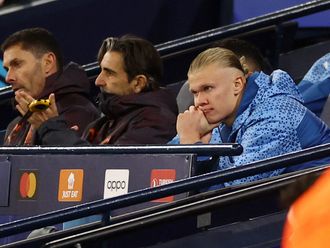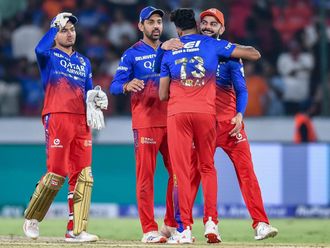Dubai: It must have been a no-brainer for the organisers of Russia 2018 to zero in on a football legend who could feature in their official poster of the World Cup. It may have been close to three decades after his death and the word USSR could be a distant memory of the Cold War days, but the image of one hero endures in their football folklore like no other — Lev Yashin.
The image of Yashin, or the ‘Black Spider’ sprawled over the frame of the poster with his eyes fixed on the ball — the trademark black gear with the flat cap hard to miss — will surely make its way to millions of homes after this World Cup as a souvenir from the spectacle. This, in a way, will be an opportunity for the football fraternity to pay homage to the man they call arguably the greatest goalkeeper in the game after so many decades.
The visitors to Moscow for the World Cup will be treated to a giant mural of the legend looking down opposite the Russian Football Union building, while his statues adorn the iconic Luzhinki Stadium and the complex of Dynamo Moscow Club — underlining his stature as the game’s biggest ambassador for the country after all these years.
There have been no dearth of great goalkeepers gracing the sport — from Yashin’s contemporary Gordon Banks to the just-retired Gianluigi Buffon. There have been the watershed moments in their career, which has put the shot-stoppers in a pedestal — if Banks had been part of England’s World Cup winning squad in 1966 — Buffon’s spell began with Italy’s triumph in 2006 and, of course, Juventus’ uninterrupted run with the Scudettos.
Yashin did not have any success of that magnitude, and it’s in this irony possibly lies his greatness. He spent his career with a single club, Dynamo Moscow, and the country colours with USSR — which was never in the same bracket as England or Italy — and their finest moment during Yashin’s reign was a fourth-place finish in the 1966 World Cup in England. There had been, of course, an Olympic gold medal in 1956 while Yashin’s Dynamo had won the then European Championship in 1960.
This, however, did not prevent him from winning the Ballon d’Or from Fifa in 1963 — the only occasion in the last half-a-century when any goalkeeper won the award. What’s more, the Fifa had named him as the ‘Best Goalkeeper of the 20th Century’ much later and the governing body’s ‘Golden Gloves’ award for the best goalkeeper is named after him.
If playing for the USSR had its limitations, the iron curtains of the Communist USSR also prevented him from accepting any club offers from Europe — which would have offered a much greater financial security. Did he have any regrets about it? In a recent interview, Valentina Yashina, the widow of the goalkeeping legend, was non-committal. “I never wonder about this, so don’t ask me what it would have been.”
How great was Yashin was a goalkeeper? The statistics are quite mind-boggling, which shows he had 270 clean sheets out of 326 club appearances, which included saving of 150 penalties. The limited Youbtube clippings available are testimony to some lightning quick reflexes — and an aura of invincibility with which he left his charge in a one-to-one situation with the rivals.
“Lev Yashin was first class, a real super goalkeeper. His positional play was excellent, but everything he did was amazing. He was a role model for goalkeeping for the next years, without a doubt,” commented Banks, his peer and a great rival.
What added to the mystique was his ingenuous ‘therapy’ of how he controlled his nerves ahead of a big game — by often having a puff — an act which would have a modern day dugout squirm at the idea. The excessive smoking led to a thrombosis of his blood vessels on the left leg and it had to be amputated when he was only 50 years old.
What was the Yashin philosophy to goalkeeping? “What kind of a goalkeeper is the one who is not tormented by the goal he has allowed? He must be tormented. If he is calm, that means the end. No matter what he had in the past, he has no future.”
They certainly don’t make men like him anymore!











